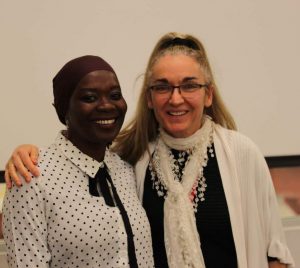By: Omair Ali

Source: Awojdyla
Dr. Fadji Maina (left) with Dr. Eva Nogales (right) at the Lawrence Berkeley National Laboratory in 2019.
Growing up with water scarcity inspired Fadji Zaouna Maina, Ph.D., to undertake the extraordinary journey from Nigerien schoolgirl to NASA earth scientist.
Maina was born and raised in Zinder, one of the largest cities in Niger [2]. Growing up, she saw the hardships for families in her community who were without reliable water access. Either they had to purchase water from neighbors, or they had to send young girls out to find water. Expecting girls to find water several miles from home is so time-consuming that it’s a significant barrier to their education [6]. Unlike many girls in her community, Maina was fortunate to have water access at home, so she was able to pursue an education [2].
As Maina grew more aware of the extensive consequences of poverty and climate change—especially the effects of water scarcity—she became driven to find ways to address these critical issues and help families in her community. She pursued a career in earth science by obtaining a Bachelor’s Degree in Geological Engineering from the University of Fes in Morocco [2]. Then, she obtained a Master’s Degree in Engineering and Environmental Sciences and a Ph.D. in Hydrology from the University of Strasbourg [2]. Afterward, Maina held postdoctoral posts in France, Italy, and California [5]. In August 2020, she began working for NASA as an earth scientist [4]. She researches mathematical models that monitor the global impacts of climate change and pollution on water availability [1].
Although she’s only in her 20’s, Maina has already achieved significant accomplishments: She’s the first Nigerien scientist at NASA, and she has been honored as a top scientist on Forbes’ 30 under 30 – Science 2020 list [1]. Undoubtedly, Maina will continue to excel in her search to understand and fight water scarcity worldwide. However, for every Fadji Zaouna Maina, there are countless Nigerien girls whose opportunities for educational attainment are beyond reach because of water scarcity.
Maina understands that she is one of very few Nigerien women to have reached her level of education and influence. As such, she has been an active advocate for improving women’s rights in the Sahel region to address the impact of climate change [3,7]. When also asked what she would say to encourage Nigerien girls to pursue their ambitions, Maina says, “Do not give up. Keep going because everyone would think people from Niger, or a young girl from Niger, would not be able to do this. But just believe in yourself and find an environment that will support you” [4].
Maina’s story is a testament to the bright futures that young Nigerien girls could have if they weren’t held back by the burdens of water insecurity. By recognizing the importance of clean water and donating to Wells Bring Hope’s water well projects, you can make a difference in many children’s lives so they can have the opportunity to become brilliant agents of change like Maina.
[1] – https://www.forbes.com/profile/fadji-zaouna-maina/#10def28f2c53
[2] – https://ne.usembassy.gov/hydrologist-fadji-mainas-path-from-niger-to-nasa/
[3] – https://en.wikipedia.org/wiki/Fadji_Maina
[5] – https://eesa.lbl.gov/profiles/fadji-zaouna-maina/

